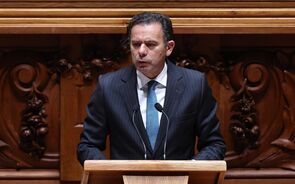David Nichols - FMR for January 18
12 mensagens
|Página 1 de 1
WASHINGTON (Reuters) - President George W. Bush will offer ideas on Friday for shoring up the fragile U.S. economy, as he and the Democratic-led Congress move forward with talks on a plan to avert a recession.
A consensus has emerged on the need for a rescue plan for an economy that has been hit hard by a housing crisis, a credit crunch and a surge in oil prices. But the details have yet to be worked out.
A package totaling up to $150 billion is under discussion between the White House and Capitol Hill, according to sources familiar with the matter who spoke on condition of anonymity. Under consideration are tax breaks for families and companies and spending to help low-income people weather the downturn.
Bush is to speak in only general terms about what type of fiscal stimulus package he would like to see, as he makes remarks at the White House on the economy on Friday at 11:50 a.m. EST.
Later in the day, Bush will visit a factory in Frederick, Maryland, and discuss the economy further.
"He'll talk about the kinds of policies that he thinks will provide temporary, effective measures to increase growth over the short term," White House spokesman Tony Fratto said.
Lending momentum to the efforts to seek a deal, Ben Bernanke, the powerful chairman of the Federal Reserve, on Thursday threw his heft behind the idea of fiscal stimulus.
Bernanke told a congressional hearing that any measure should be designed to kick in quickly.
Bleak reports this week on retail sales and the troubled housing sector have reinforced concerns about the health of the economy.
On Wall Street, the concerns were reflected in a 307-point decline in the Dow Jones industrial average on Thursday.
Lawmakers and White House officials agreed with Bernanke that time was of the essence.
"In the next few days, through ongoing bipartisan negotiations, we are hopeful that we will agree on legislation that provides timely, targeted, and temporary assistance to America's middle class," said House of Representatives Speaker Nancy Pelosi, a California Democrat.
Fratto said there seemed to be urgency among both Republicans and Democrats to work out an agreement.
"We do want to try to pass something quickly," he said.
Bitter fights over domestic spending and the Iraq war marked relations between Bush and the Congress last year, making many analysts initially skeptical that the two sides could come together on a fiscal stimulus plan.
But with many private analysts saying the economy might already be in a recession, neither the White House nor the Congress wants to be blamed for inaction.
The debate over a stimulus package has roiled the campaign trail, where candidates are vying to succeed Bush in the November 4 election.
All three major Democratic candidates -- Sen. Hillary Clinton, Sen. Barack Obama and former Sen. John Edwards -- have offered plans with spending and tax-cut ideas.
Republican Sen. John McCain on Thursday laid out a proposal for cuts in corporate tax rates and incentives for companies to invest in new equipment and research. One of his main Republican rivals, former Massachusetts Gov. Mitt Romney, is also getting set to unveil a plan.
(Additional reporting by Donna Smith)
(Reporting by Caren Bohan; Editing by Jackie Frank)
Copyright 2008 Reuters
A consensus has emerged on the need for a rescue plan for an economy that has been hit hard by a housing crisis, a credit crunch and a surge in oil prices. But the details have yet to be worked out.
A package totaling up to $150 billion is under discussion between the White House and Capitol Hill, according to sources familiar with the matter who spoke on condition of anonymity. Under consideration are tax breaks for families and companies and spending to help low-income people weather the downturn.
Bush is to speak in only general terms about what type of fiscal stimulus package he would like to see, as he makes remarks at the White House on the economy on Friday at 11:50 a.m. EST.
Later in the day, Bush will visit a factory in Frederick, Maryland, and discuss the economy further.
"He'll talk about the kinds of policies that he thinks will provide temporary, effective measures to increase growth over the short term," White House spokesman Tony Fratto said.
Lending momentum to the efforts to seek a deal, Ben Bernanke, the powerful chairman of the Federal Reserve, on Thursday threw his heft behind the idea of fiscal stimulus.
Bernanke told a congressional hearing that any measure should be designed to kick in quickly.
Bleak reports this week on retail sales and the troubled housing sector have reinforced concerns about the health of the economy.
On Wall Street, the concerns were reflected in a 307-point decline in the Dow Jones industrial average on Thursday.
Lawmakers and White House officials agreed with Bernanke that time was of the essence.
"In the next few days, through ongoing bipartisan negotiations, we are hopeful that we will agree on legislation that provides timely, targeted, and temporary assistance to America's middle class," said House of Representatives Speaker Nancy Pelosi, a California Democrat.
Fratto said there seemed to be urgency among both Republicans and Democrats to work out an agreement.
"We do want to try to pass something quickly," he said.
Bitter fights over domestic spending and the Iraq war marked relations between Bush and the Congress last year, making many analysts initially skeptical that the two sides could come together on a fiscal stimulus plan.
But with many private analysts saying the economy might already be in a recession, neither the White House nor the Congress wants to be blamed for inaction.
The debate over a stimulus package has roiled the campaign trail, where candidates are vying to succeed Bush in the November 4 election.
All three major Democratic candidates -- Sen. Hillary Clinton, Sen. Barack Obama and former Sen. John Edwards -- have offered plans with spending and tax-cut ideas.
Republican Sen. John McCain on Thursday laid out a proposal for cuts in corporate tax rates and incentives for companies to invest in new equipment and research. One of his main Republican rivals, former Massachusetts Gov. Mitt Romney, is also getting set to unveil a plan.
(Additional reporting by Donna Smith)
(Reporting by Caren Bohan; Editing by Jackie Frank)
Copyright 2008 Reuters
- Mensagens: 395
- Registado: 29/11/2007 10:02
- Localização: POVOA STºIRIA
Excelente!!
Ptmasters,
Mais uma vez muito obrigado pelos teus posts do DN!
Como ele diz, é um dia de bolsa potencialmente excepcional...
A acompanhar nas sidelines!
Um abraço,
Eagle Eye 2002
Mais uma vez muito obrigado pelos teus posts do DN!
Como ele diz, é um dia de bolsa potencialmente excepcional...
A acompanhar nas sidelines!
Um abraço,
Eagle Eye 2002
- Mensagens: 458
- Registado: 5/1/2008 22:22
AP
Bush to Lay Out Stimulus Ideas Friday
Friday January 18, 8:37 am ET
By Andrew Taylor, Associated Press Writer
With Concerns Over the Economy Growing, Bush to Offer Ideas for a Stimulus Package Friday
WASHINGTON (AP) -- President Bush is putting together his first public call for a "robust" emergency fiscal stimulus bill to get cash quickly into the pockets of consumers and jump-start a sagging economy, his treasury secretary said Friday.
Bush planned to lay out his position later in the day, but he wasn't expected to go into specifics. Press secretary Dana Perino said Bush would demand that any package be effective, simple and temporary -- mirroring calls by Democratic lawmakers for a "timely, targeted and temporary" stimulus measure.
Taxpayers could receive rebates of up to $800 for individuals and $1,600 for married couples under a White House plan. Although lawmakers were considering smaller rebate checks and more money for food stamp recipients and the unemployed, Bush told congressional leaders that he favors income tax rebates for people and tax breaks for business investment.
"What he believes is that we've got to do something that is robust. It's going to be temporary and get money into the economy quickly," Treasury Secretary Henry Paulson said Friday on CBS's "The Early Show." "It's going to be focused on consumers, individuals, families -- putting money in their pocket. And it's going to be focused on giving businesses the incentive to hire people, to create jobs."
Federal Reserve Chairman Ben Bernanke entered the stimulus debate Thursday, endorsing the idea of putting money into the hands of those who would spend it quickly and boost the flagging economy.
The scramble to take action came as fears mounted that a severe housing slump and a painful credit crisis could cause people to clamp down on their spending and businesses to put a lid on hiring, throwing the country into its first recession since 2001.
Aides to lawmakers involved in the talks said the White House also wants to eliminate the 10 percent income tax bracket for one year and issue a rebate within months. Advocates for the poor said that tens of millions of people in lower income ranges would be left out or not fully feel the benefit of the White House plan.
Lawmakers were instead discussing a $500 rebate for individuals, the aides said, with details for couples and people with children still being negotiated.
The rebates would likely be limited to individuals with incomes of $85,000 or less and couples with incomes of $110,000 or less, the aides said, speaking on condition of anonymity because no final decisions had been made.
The president did not push for a permanent extension of his 2001 and 2003 tax cuts, many of which are due to expire in 2010, officials said. That would eliminate a potential stumbling block to swift action by Congress, since most Democrats oppose making the tax cuts permanent.
White House counselor Ed Gillespie said Friday on CNN the White House would still like to see the tax cuts made permanent, but the president believes a stimulus plan needs to be put into place within the next few weeks.
Bernanke voiced his support for a stimulus package in an appearance before the House Budget Committee. He stressed that it must be temporary and must be implemented quickly -- so that its economic effects could be felt as much as possible within the next 12 months.
"Putting money into the hands of households and firms that would spend it in the near term" is a priority, he said.
Especially important is making sure a plan can put cash into the hands of poor people and the middle class, who are most likely to spend it right away, he said, though he added that research shows affluent people also spend some of their rebates.
Bernanke declined to endorse any particular approach, but he did say he preferred one that would not have a long-term adverse impact on the government's budget deficit.
Senior aides to House Democrats and Republicans said in addition to included tax rebates for individuals, the emerging measure would contain tax breaks for businesses investing in new equipment, increases in food stamps, and higher unemployment benefits. They spoke on condition of anonymity, since the talks are ongoing and lawmakers have promised not to reveal details.
House Speaker Nancy Pelosi said she wanted legislation enacted within a month and said the government must "spend the money, invest the resources, give the tax relief in a way that again injects demand into the economy, puts it in the hands of those who need it most and into the middle class ... so that we can create jobs."
For now, Bernanke was hopeful the country could skirt a dangerous downturn.
"We're not forecasting recession but, rather, at this point, slow growth," he told lawmakers. Still, the toll of the housing and credit debacles will be felt into early next year, he added.
"The Best Way To Predict Your Future Is To Create It"
Boas,
obrigado pelo esclarecimento.
Mas este rally seria sol de pouca dura não?
É que a redução drástica da taxa de juros iria trazer outras consequências graves a longo prazo, sendo o topo da lista um aumento da inflacção?
Correcto?
Desculpem lá estas minhas questões noobs mas um pobre farmacêutico tem algumas limitações ao nível de análise macroeconómica!
Abraços e obrigado.
obrigado pelo esclarecimento.
Mas este rally seria sol de pouca dura não?
É que a redução drástica da taxa de juros iria trazer outras consequências graves a longo prazo, sendo o topo da lista um aumento da inflacção?
Correcto?
Desculpem lá estas minhas questões noobs mas um pobre farmacêutico tem algumas limitações ao nível de análise macroeconómica!
Abraços e obrigado.
urukai Escreveu:Eu só não percebi que tipo de acção é que ele queria que o FED tomasse?
Redução dos juros? Não é isso que está a pressionar e restringir o mercado? Eficaz no curto prazo mas desastroso no longo prazo?
Agradeço uma ajuda dos noctívagos.
----
Quanto ao dia de amanhã ele deposita todas as esperanças (para o bem ou para o mal) na sessão da manhã dos states, ou seja, nosso fecho. A ver vamos se é um dia memorável ou não!
Na prática, o mercado norte americano negoceiam já as taxas de juro a 2 anos a 2,48%. Ora, se a taxa de referência está a 4,25%, não só está muito alta para o valor que o mercado está a negociá-las, como o caminho ainda existe um longo caminho de cerca de 1,75% de cortes que deveriam ocorrer. Na prática, este "gap" entre a taxa de referência e o valor em que as mesmas são negociados, deverá ser corrigido pela FED.
O que daqui pode resultar, é que a uma movimentação "drástica" por parte da FED neste momento (entenda-se um corte superiore a 0,5%), pode levar a um rally fortíssimo dos índices US.
1 ab
O que é um cínico? É aquele que sabe o preço de tudo, mas que não sabe o valor de nada.
urukai Escreveu:Eu só não percebi que tipo de acção é que ele queria que o FED tomasse?
Redução dos juros? Não é isso que está a pressionar e restringir o mercado? Eficaz no curto prazo mas desastroso no longo prazo?
Agradeço uma ajuda dos noctívagos.
----
Quanto ao dia de amanhã ele deposita todas as esperanças (para o bem ou para o mal) na sessão da manhã dos states, ou seja, nosso fecho. A ver vamos se é um dia memorável ou não!
Quando disse que se iria resolver, não disse que tudo se iria resolver. Mas ele de facto pensa que vai ser um dia memorável, para o bem ou para o mal. E de facto as sextas-feiras não costumam ser muito positivas para o mercado.
Penso que no artigo ele não diz o que o FED deve fazer, apenas refere é que o mercado perdeu a confiança na FED e no seu presidente, pois fala fala fala e eu não o vejo a fazer nada
Abraço
JP
Eu só não percebi que tipo de acção é que ele queria que o FED tomasse?
Redução dos juros? Não é isso que está a pressionar e restringir o mercado? Eficaz no curto prazo mas desastroso no longo prazo?
Agradeço uma ajuda dos noctívagos.
----
Quanto ao dia de amanhã ele deposita todas as esperanças (para o bem ou para o mal) na sessão da manhã dos states, ou seja, nosso fecho. A ver vamos se é um dia memorável ou não!
Redução dos juros? Não é isso que está a pressionar e restringir o mercado? Eficaz no curto prazo mas desastroso no longo prazo?
Agradeço uma ajuda dos noctívagos.
----
Quanto ao dia de amanhã ele deposita todas as esperanças (para o bem ou para o mal) na sessão da manhã dos states, ou seja, nosso fecho. A ver vamos se é um dia memorável ou não!
David Nichols - FMR for January 18
Meus caros,
Letter para hoje.
1 ab e bn
Letter para hoje.
1 ab e bn
- Anexos
-
 18012008-FMR.pdf
18012008-FMR.pdf- (60.85 KiB) Transferido 381 Vezes
O que é um cínico? É aquele que sabe o preço de tudo, mas que não sabe o valor de nada.
12 mensagens
|Página 1 de 1
Quem está ligado:
Utilizadores a ver este Fórum: AAA_, aaugustob69, Google [Bot], Kooc, latbal, Masterchief, OCTAMA, paul_invest, PAULOJOAO, Pmart 1, Shift72, Shimazaki_2, smog63, trilhos2006, VALHALLA, yggy e 94 visitantes



